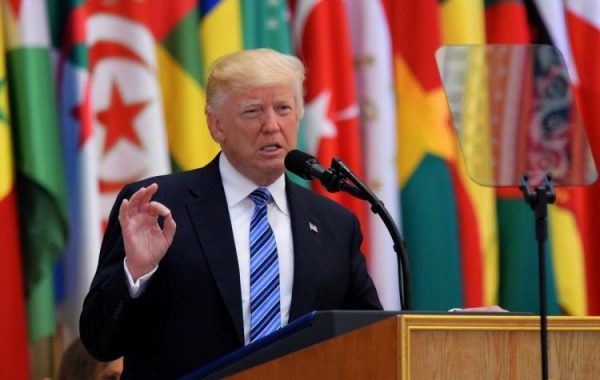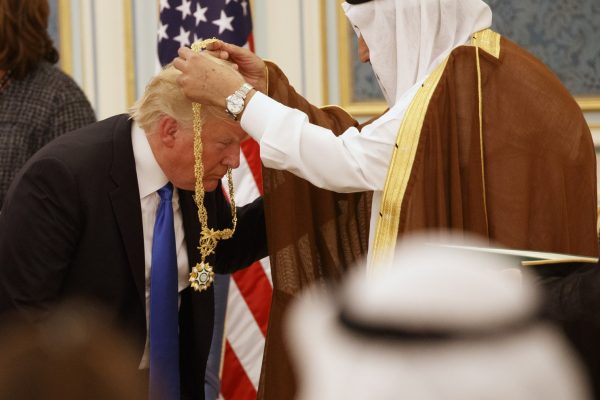
Donald Trump has launched a fierce attack on Iran, just a day after the country re-elected its moderate president on a platform of re-engagement with the outside world.
Speaking to an audience of Arab and Muslim leaders in Saudi Arabia, the US president singled out Tehran for fueling “the fires of sectarian conflict and terror” as he called on Gulf nations to “drive out terrorists and extremists”.
Mr Trump’s stance contrasts starkly with that of his predecessor Barack Obama, who two years ago struck a landmark nuclear deal with Iran and whose administration had a strained relationship with Tehran’s Sunni rivals in the Gulf.
During a trip that has sought to bolster ties with Arab countries — and step up arms sales — Mr Trump called the fight against terrorism a “battle between good and evil”.
Blaming Iran for funding, arming and training militias that “spread destruction and chaos”, he said the regime was “responsible for so much instability”.
He called on the region to drive extremists “out of your places of worship . . . your communities . . . your holy land . . . this earth”.
The carefully calibrated speech marked a spectacular U-turn for a president who during his campaign declared that “Islam hates us” and advocated a ban on Muslim visitors to the US.
The trip comes at a time when Mr Trump is facing a political crisis at home over the investigation into his campaign’s possible collusion with Russia ahead of last year’s US election. In an attempt to appear more statesmanlike, Mr Trump read the speech solemnly from his teleprompter, making none of his usual provocative asides.
Speaking of Iran, he said: “It is a government that speaks openly of mass murder, vowing the destruction of Israel, death to America, and ruin for many leaders and nations in this room,”
His speech came the same weekend that Iranians voted to re-elect President Hassan Rouhani, in a sign that the majority of the population was keen to lessen its isolation.
“Just when Iranians voted overwhelmingly for openness and engagement with the world, Trump clenched his fist and responded by calling for Iran’s isolation,” said Trita Parsi, president of the National Iranian American Council.
Iran has not officially reacted to Mr Trump’s speech but Javad Zarif, the foreign minister, in a post on Twitter mocked the US alliance with Saudi Arabia. “Iran — fresh from real elections — attacked by @POTUS in that bastion of democracy & moderation. Foreign Policy or simply milking KSA of $480B?” it said.
Iran—fresh from real elections—attacked by @POTUS in that bastion of democracy & moderation. Foreign Policy or simply milking KSA of $480B? pic.twitter.com/ahfvRxK3HV
— Javad Zarif (@JZarif) May 21, 2017
Mr Trump pushed for Arab countries to do more for their regional defence, pledging to “build new partnerships in pursuit of peace”.
The US and Saudi sealed deals of between $280bn and $380bn, including an arms deal for the kingdom valued at $110bn.
The president’s scripted remarks notably avoided the use of the term “Islamic terrorism”, substituting that for the more commonly accepted “Islamist terrorism”, which implies the politicised form of the religion as opposed to Islam as a whole. But Mr Trump, accidentally or not, at least once reverted back to his previous use of “Islamic terrorism” in the speech.
One of the text’s chief authors was reportedly Stephen Miller, an important figure in drafting the administration’s travel ban on citizens from six Muslim majority countries — a measure that has so far been prevented from taking effect by the US courts. But, overall, the speech struck a more moderate tone causing some longtime nationalist advisers to complain of a more mainstream Republican influence.
“We are not here to lecture — we are not here to tell other people how to live, what to do, who to be, or how to worship,” Mr Trump said, in comments that appeared to highlight a contrast with the Obama administration’s greater focus on human rights.
The US leader said that the Middle East, often described as the birthplace of civilisation, was “waiting to begin a new renaissance”. But broadly, his speech portrayed the fight against terrorism as the defining struggle of the era.
“Will we be indifferent in the presence of evil? Will we protect our citizens from its violent ideology? Will we let its venom spread through our societies?” he said.
“But if we act — if we leave this magnificent room unified and determined to do what it takes to destroy the terror that threatens the world — then there is no limit to the great future our citizens will have.”
His speech was met with polite applause, with only a small corner of the hall dominated by his advisers and staff giving him a standing ovation.
At the gala lunch before the speech, delegates crowded around the Trumps as they departed, several of them trying to snap surreptitious selfies with the president. Officials lined up to talk to his daughter, Ivanka, and her husband Jared Kushner.
On Sunday, during a meeting with Bahrain’s King Hamad, he acknowledged that there had previously been “a little strain” between the US and the country but added: “There won’t be strain with this administration.”
International rights groups have long been critical of the Bahraini kingdom’s crackdown on its political opponents.
Before meeting Tamim bin Hamad al Thani, the Emir of Qatar, Mr Trump said: “One of the things that we will discuss is the purchase of lots of beautiful military equipment because nobody makes it like the US.”
But the weapons supplied might also be used in campaigns such as the war that Saudi Arabia and its allies are waging against Houthi rebels in Yemen, a country where, the UN says, millions of people are now facing famine.
In a sign of the cordial relations between the region’s leaders and the new administration, President Abdel Fatah al-Sisi of Egypt, who has launched a crackdown on the opposition in his country, feted Mr Trump as “a unique personality that is capable of doing the impossible”. That comment drew a laugh, as did the remark “I agree” from the US president, who complimented Mr Sisi on his shoes.

Many conservatives criticised Mr Obama for bowing to the late Saudi king Abdullah during one diplomatic encounter and Mr Trump promised a more muscular approach to the Middle East.
But on Saturday he appeared to both bow and curtsy to King Salman as he received Saudi Arabia’s highest civilian honour.
FINANCIAL TIMES

Leave a Reply
You must be logged in to post a comment.